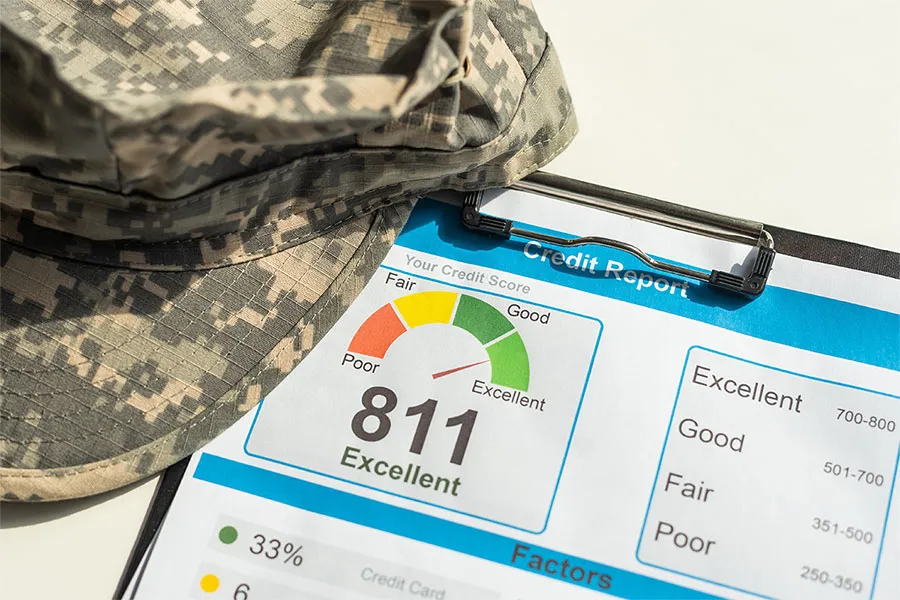What We'll Cover
- Financial tools for adapting to civilian life, like creating a budget, building your credit score and saving for retirement
- How to identify and avoid financial scams
- Financial resources for veterans, like debt payoff assistance, VA loans, and hardship resources
The transition from military life to civilian life comes with some financial challenges, including getting a job, managing finances and building credit. But veterans don’t have to face these challenges alone. Several resources exist to help veterans improve their financial literacy and get financial assistance if needed.
If you’re looking for financial assistance for veterans, this guide has you covered.
Financial Literacy for Veterans
Learning to manage finances and debt can be a challenge when adjusting to civilian life. According to a survey by the National Foundation for Credit Counseling (NFCC), veterans are almost twice as likely to have debt carried over from month to month than civilians. Plus, about 55% of veterans believe they’re ill-prepared for a financial emergency.
If you find yourself in this situation, it’s not your fault and you’re not alone. Since the government has made most of your financial decisions for you while you were focused on protecting our country, all the decisions you now have to make can be overwhelming.
Why is financial literacy important for veterans?
Financial literacy for veterans is important to help you get on your feet and feel confident managing your finances. Now is the time to learn how to budget, get new health insurance coverage, increase your credit score and handle many more expenses than you’ve been used to.
Unfortunately, veterans can also be vulnerable to financial scams. In 2021, scams against veterans totaled $26 million, according to the Federal Trade Commission (FTC). Financial literacy is important to help you identify and avoid these scams.
Let’s dive into a few financial literacy topics to help get you started in managing your finances.
How to build your credit score
Building credit is essential to living a financially independent life. If you plan to buy a car or a house at any point in the future, chances are you’re going to need a loan, which means a lender will want to make sure you have a history of reliable borrowing. Making payments on time for a credit card, personal loan, even utility bills is one way to start building a healthy credit score.
To establish and build good credit, try one of these options:
- Become an authorized user: Become an authorized user on someone else’s account, only if you know they have a history of being extremely responsible with credit cards.
- Apply for a credit card: By making on-time payments and keeping your balance low, your credit score will improve.
- Make phone and utility payments on time: If your utility and phone bill payments are reported to the three credit bureaus, then making on-time payments will help your credit score.
Learn more about how a credit score works and best practices for using a credit card to establish credit in our resources below.
Building Credit Resources for Veterans
How to create a post-military budget
Budgeting is key to help you create financial stability. Creating a budget will help you cover your expenses and save for emergencies, a down payment on a home, retirement and short-term goals. Stick to budgeting for at least 90 days to encourage the habit to stick. It may feel tough at first but you should start to settle into a flow by Month 3.
Budgeting Resources for Veterans
Avoid financial scams.
Unfortunately, veterans are prone to financial scams. If you suspect something is too good to be true, check with this extensive list of scams from AARP. Here are a few tips to protect your finances and identity.
- Check credentials. Investment advisors may offer schemes to get you additional benefits.
- Research property to verify ownership. Properties may be offered for sale or rent to veterans at a discount but ensure that the offer is legitimate by doing your research first.
- Don’t give out critical information over the phone. Avoid sharing your credit card number, social security number or other important information over the phone unless you’re sure of who you’re speaking with.
Financial Security Resources for Veterans
- How to Protect Your Identity and Other Assets
- 5 Personal Finance Myths from Social Media You Should Ignore
- Building a Budget From Scratch
Saving for retirement
- VA Benefits Administration
- Military service credits
- Tax-free contributions to a special retirement account like a Thrift Savings Plan
The savings resources below all provide great tips for retirement planning.
Retirement Resources for Veterans
- How to Prioritize Your Savings Goals When You’re Just Starting Out
- How Much of My Paycheck Should I Save?
- Retiring in Arizona: 10 Steps You Should Take
Buying a home
Veterans can take advantage of VA loans when applying for a mortgage. Backed by the Department of Veterans Affairs, these loans are exclusive to service members and veterans of the U.S. Military. No down payment is required, so qualifying borrowers can get 100% financing without paying mortgage insurance.
VA loans have more lenient credit and debt-to-income requirements than conventional loans. They also typically come with lower interest rates and lower closing costs.
Retirement Resources for Veterans
Financial Resources for Veterans
From paying off debt to going back to school or buying a home, look into financial assistance for veterans. Take advantage of these resources to maximize your finances and your life.
Debt Payoff Resources
If you’re struggling with paying back debt, look into these resources and services that can help you manage your debt and develop a debt payoff plan.
Financial Grants
Veterans can apply for financial assistance through grant programs without worrying about taking on debt and paying anything back.
Tuition Assistance
Veterans and even eligible family members receive benefits toward education and career counseling.
- Learn about military branch scholarship programs through USA.gov
- VA education and training benefits
Hardship Resources
Several resources are available to help veterans through financial hardships. Start with the following:
Key Takeaways
- Veterans are almost twice as likely to have debt carried over from month to month (58%) than civilians (just 34%).
- Veterans are prone to scams. Speak to your local VA office if you have any concerns.
- Veterans may be eligible for benefits like VA Disability Compensation and VA Pension which can help supplement retirement income.
- Building good credit can help you get access to better loan rates and more financial opportunities.
Adjusting back to civilian life comes with its challenges, finances being a big one. But no one has to go it alone. Take advantage of financial assistance for veterans to cover hard times, and brush up on budgeting and saving to build up your financial literacy.
APR = Annual Percentage Rate












